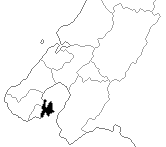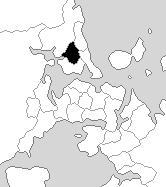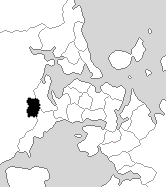Related Research Articles

Miramar was a New Zealand parliamentary electorate in the south-eastern suburbs of Wellington. It was created in 1946, replacing Wellington East, and was replaced by Rongotai for the first MMP election of 1996.
Hauraki is a former New Zealand parliamentary electorate, from 1928 to 1987 and 1993 to 1996. In the 1987 general election it was renamed Coromandel, the name that had been used from 1972 to 1981. In 1993 it reverted to Hauraki, but became Coromandel again for the first MMP election in 1996.

Panmure is a former New Zealand parliamentary electorate in the southern suburbs of the city of Auckland, from 1984 to 1996. In the four parliamentary terms of its existence, it was first represented by Bob Tizard of the Labour Party, and then by his daughter Judith Tizard.

Onehunga, initially with the formal name of Town of Onehunga, is a former New Zealand parliamentary electorate in the south of the city of Auckland. Between 1861 and 1881, and between 1938 and 1996, it was represented by seven Members of Parliament. It was a stronghold for the Labour Party.
Kapiti was a New Zealand parliamentary electorate, from 1972 to 1996. A bellwether electorate, it frequently changed between National and Labour.
Horowhenua was a New Zealand parliamentary electorate, from 1978 to 1996.

Glenfield was a New Zealand parliamentary electorate for four terms, from 1984 to 1996. It was represented by two members of parliament, first Judy Keall of the Labour Party, and then Peter Hilt of the National Party. Hilt defected to United New Zealand in 1995.

Birkenhead was a New Zealand Parliamentary electorate on Auckland's North Shore from 1969 to 1996, when it was absorbed into the Northcote electorate.
Fendalton is a former New Zealand parliamentary electorate. It existed during two periods between 1946 and 1996. The electorate was in the western suburbs of Christchurch, New Zealand. Fendalton is an expensive suburb, and was always represented by the National Party.
St Kilda is a former New Zealand parliamentary electorate. It existed from 1946 to 1996 and was represented by four Members of Parliament.

Eastern Hutt is a former New Zealand parliamentary electorate from 1978 to 1996. It was represented by two Labour MPs.
Tasman is a former New Zealand parliamentary electorate, from 1972 to 1996.
West Coast is a former New Zealand Parliamentary electorate, from 1972 to 1996.
Tongariro is a former New Zealand parliamentary electorate, from 1984 to 1996. During the four parliamentary terms of its existence, it was represented by three members of parliament.
West Auckland is a former New Zealand parliamentary electorate on the western outskirts of Auckland, created for the 1984 election from part of the former Helensville electorate. The electorate was abolished for the 1993 election, and split between Henderson and Waitakere electorates.

Henderson is a former New Zealand parliamentary electorate, from 1969 to 1978 and then from 1993 to 1996.
Yaldhurst is a former New Zealand parliamentary electorate, near the city of Christchurch. The electorate was to the southwest of Christchurch, and was suburban and semi-rural.
Wairau was a parliamentary electorate in the Marlborough Region of New Zealand. It was one of the initial 24 New Zealand electorates and existed from 1853 until its abolition in 1938, when it was succeeded by the Marlborough electorate. The electorate had 13 representatives during its existence. The 1861 election in the Wairau electorate was notable in that a later Premier, Frederick Weld, was unexpectedly and narrowly defeated by William Henry Eyes.
Waimea-Sounds was a fully rural parliamentary electorate in the Marlborough and Nelson Regions of New Zealand, from 1893 to 1896. During its one parliamentary term of existence, the Waimea-Sounds electorate was represented by one Member of Parliament.
Hastings was a parliamentary electorate in the Hawke's Bay Region of New Zealand from 1946 to 1996. The electorate was represented by nine Members of Parliament. The Hastings electorate was a typical bellwether electorate, frequently changing between the two main parties.
References
- McRobie, Alan (1989). Electoral Atlas of New Zealand. Wellington: GP Books. ISBN 0-477-01384-8.
- Norton, Clifford (1988). New Zealand Parliamentary Election Results 1946-1987: Occasional Publications No 1, Department of Political Science. Wellington: Victoria University of Wellington. ISBN 0-475-11200-8.
- Wilson, James Oakley (1985) [First published in 1913]. New Zealand Parliamentary Record, 1840–1984 (4th ed.). Wellington: V.R. Ward, Govt. Printer. OCLC 154283103.